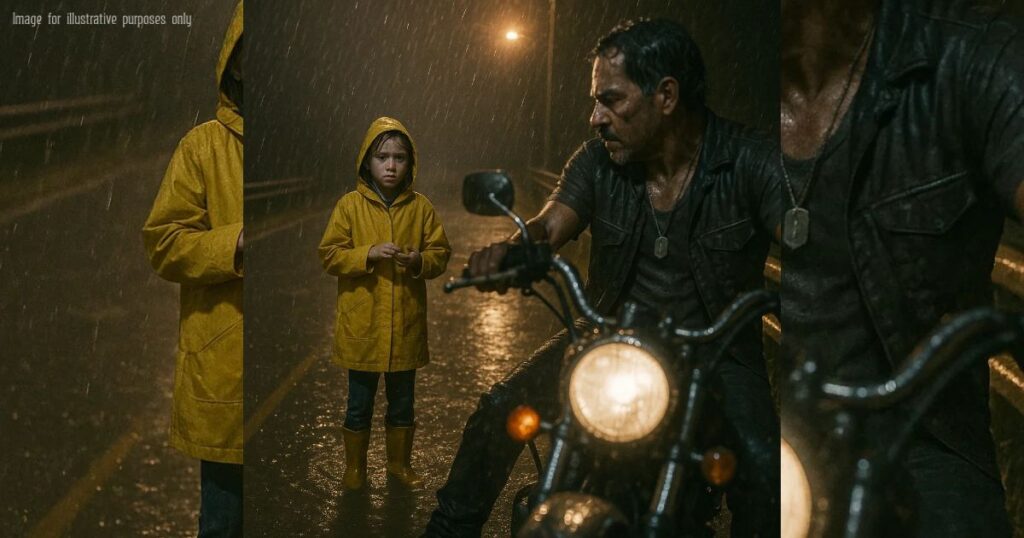At the hospital, a woman from social services met us with a clipboard but kind eyes.
“I’m Alyssa,” she said. “We’ll make sure they’re safe.” She glanced at June, then to me. “Are you family?”
June answered before I could.
She made a sign at her chest, then at me, then interlaced her fingers.
I caught it: Stay. With. Ghost. She looked at Alyssa and held the gaze of a person who has already crossed the bridge and expects others to follow.
“I can be emergency kin if you need a box to check,” I said. “I own a garage. I’m a veteran. Background’s clean. Whatever you need to see, I’ll sign.”
Alyssa studied June, then me, then the soaked tow strap looped over my shoulder.
“Let’s start with tonight,” she said softly. “We’ll keep everybody together until Grandma’s evaluated. After that, we’ll move step by step.”
Step by step turned into days.
The baby—Noah—kept a close watch on the world and let us know when anything felt unfair.
June rarely left his side.
When she slept, it was in a chair pulled against his crib like a small fort. The doctors said Mae’s leg would heal with rest. Her blood pressure would take longer; her stubbornness was immediate.
June and I built a vocabulary.
I learned thank you, hungry, okay, afraid, together, home. She learned spark plug, ratchet, coffee, helmet.
In the evenings at my garage, I’d flip the sign to CLOSED and we’d sit on milk crates at the workbench.
She’d teach me a new sign. I’d teach her the names of tools. We both got good at almost—the sign where you miss the shape the first time and laugh and try again.
Alyssa visited often.
Not to pry, but to witness.
Paperwork moved with surprising speed when a whole county saw what a yellow raincoat and a tow strap had made possible. Mae moved into a small rental two streets from my place. I started keeping a box of board books and a pile of clean towels by the shop door. On storm days, June would stand there and watch the clouds with her palm turned up, feeling the air.
One night, thunder climbed into the hills and set up camp.
June’s shoulders ratcheted tight.
I flicked the breaker and the garage fell quiet except for the rain drumming the roof. I signed, Afraid? She nodded, then signed Still. Walk. Her eyes found mine. We walked anyway.
I touched the dog tags under my shirt.
“Yeah,” I signed back, slow but clear.
We walk anyway.
She thought about that, then grinned and drew a quick sign I hadn’t seen—index and middle finger like a road, the letter G tracing a diagonal across a chest.
She tapped my jacket and repeated it. Her gift: a name-sign. A way to say Ghost without sound.
A year later, the county cut the ribbon on a new bridge.
The river ran lower, chastened for now.
People showed up with casseroles and lawn chairs and stories.
Nobody said miracle out loud; they didn’t have to.
June wore the same yellow raincoat because of course she did.
I stood beside Mae, who kept telling nurses she’d be fine as soon as the band stopped playing so loud. Noah toddled between us, convinced every motorcycle was a parade made for him.
Alyssa found us at the railing.
“You know,” she said, looking at June’s hands as they flew through a story I half-understood, “some families sign paperwork. Some families sign with their lives.” She shrugged, a little embarrassed by her own poetry. “Either way, it counts.”
June tugged my sleeve and pointed at the water.
She signed, Fear—fingers plucking at the chest—then Information, an open hand tapping her forehead. Then she made the road sign again and pushed it forward. Go.
I laughed, because somehow she had taken my whole stubborn heart and turned it into a sentence.
I signed it back, cleaner this time. Fear is information. We go. Together.
She nodded, satisfied, and leaned into my side.
The band struck a hopeful chord.
The county judge said words about resilience and neighbors.
Mae dabbed her eyes and claimed it was just the wind. Noah clapped at nothing in particular. The river slid by, pretending it had never raised its voice.
People ask sometimes why I stopped for a small figure on a flooded bridge. I tell them the truth.
Because the road teaches you the difference between noise and signal.
Because sometimes the only siren you can trust is a child’s hands spelling now in the rain.
Because family isn’t only who you’re born to. It’s who you meet at the edge of the water, when going forward is the only way to bring each other home.
We walked anyway. And that made all the difference.
Thank you so much for reading this story!
I’d really love to hear your comments and thoughts about this story — your feedback is truly valuable and helps us a lot.
Please leave a comment and share this Facebook post to support the author. Every reaction and review makes a big difference!
This story is a work of fiction created for entertainment and inspirational purposes. While it may draw on real-world themes, all characters, names, and events are imagined. Any resemblance to actual people or situations is purely coincidenta


